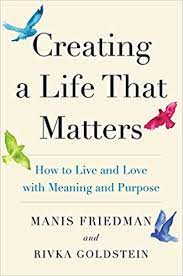
Creating a Life That Matters: How to Live and Love with Meaning and Purpose by Manis Friedman and Rivka Goldstein
“God tells us, ‘Six days of the week you should work, but on the seventh day, on Shabbos, do no labor.’ What he means is, for six days do whatever you need to do to make your existence easier. If something is broken, fix it; if it’s raw, cook it; if it is torn, sew it; if it’s too cold, heat it up…But one day out of the week, leave your existence alone, take a break, and turn your attention to life.” In this book, Manis Friedman and Rivka Goldstein offer a tutorial on living life and navigating our way through relationships with our family, friends, God, and even ourselves, using teachings “derived, whether directly or indirectly, from the Chabad Chassidic wisdom tradition.”
I admit I was a trifle skeptical as I read the first few chapters- “Life After Death?”, “Why Are We Here?”, “I’m a Terrible Person”- not exactly questions I wanted or needed to ask myself. But then, early in the book, Rabbi Friedman explains that “our mission is not to get to heaven but to bring Godliness down to earth” by doing a mitzvah, a good deed; “[W]e’ve transformed a little piece of earth into heaven. It’s called tikkun olam, repairing the world.” In order to get into this world, we are born, a process described in detail again referencing the Chassidic wisdom; we live, love, form relationships, find our bashert (with help pre-birth from God and post-birth from a shadchan, again according to Chassidism), and find happiness in our families and ourselves.
In the intriguing chapter “Why Are We Here?”, the answer is “you’re here for another. In the course of doing one person a favor, you’ll inevitably help a lot of people indirectly. You help a man make a couple of dollars, he succeeds in feeding his family, his family grows up and raises many more healthy generations. It’s a ripple effect.” We’ve all heard stories of people who help a friend just by smiling at the right time. Many years ago I paid a shiva call to an acquaintance, a woman, who had lost her mother. This woman was a few years older than me; my interactions with her had been walking past each other in the school hallways and nodding a shy greeting to her at shul. I doubted she would even remember me at the shiva call. But to my amazement, she greeted me with a smile, reminding me that my smiling at her in those gray locker-lined hallways or in our large shul always made her feel warm and welcome. My father, obm, would urge shy me just to smile- no need to converse (me? Talk to a stranger?), just give a smile. Nice chapter in the book; lifelong advice from my dear dad.
There is a section on marriage and another on parenting, both emphasizing showing respect to our bashert, our intended partner, and teaching our children to respect us as we raise them with patience and understanding. “Imagine a frog being shocked that its tadpoles don’t look anything like it. If the kids aren’t living up to your expectations, remain calm and optimistic, and they’ll no doubt turn out the way they were taught to be. All the frog has to do is wait a few weeks and the tadpoles will become frogs too.” Those little frogs should be taught to respect their parents as well- “A child should stand up to acknowledge his parents when they walk into a room.” My children when little continued to play on the floor when I walked into the room (I was happy they were occupied!); as parents themselves, they do now stand when I enter and gleefully declare, “Oh great, you’re here! Watch the children! Now I can go and (fill in the blank: take my walk, fold my laundry, take a break, finally have breakfast!).” Maybe this is not the Chassidic intention, but it’s nice to know I’m honored and respected even if it’s merely for my skills as a Bubbie!
There is much more contained within these pages- how to let go of the past, live in the present, remain optimistic, share yourself with others. “Choose life…You can come alive, and instead of worrying about your own existence, concern yourself with others. You’ll make a difference in the world.” We are all Jews no matter our level of observance, we are all important, we can smile at others and at ourselves, we can do mitzvos, good deeds. We can repair our little world and the world around us and raise generations to do the same. Creating a Life That Matters is a good guidebook for that journey.
Randy Rubinstein lives in Sharon, Massachusetts
